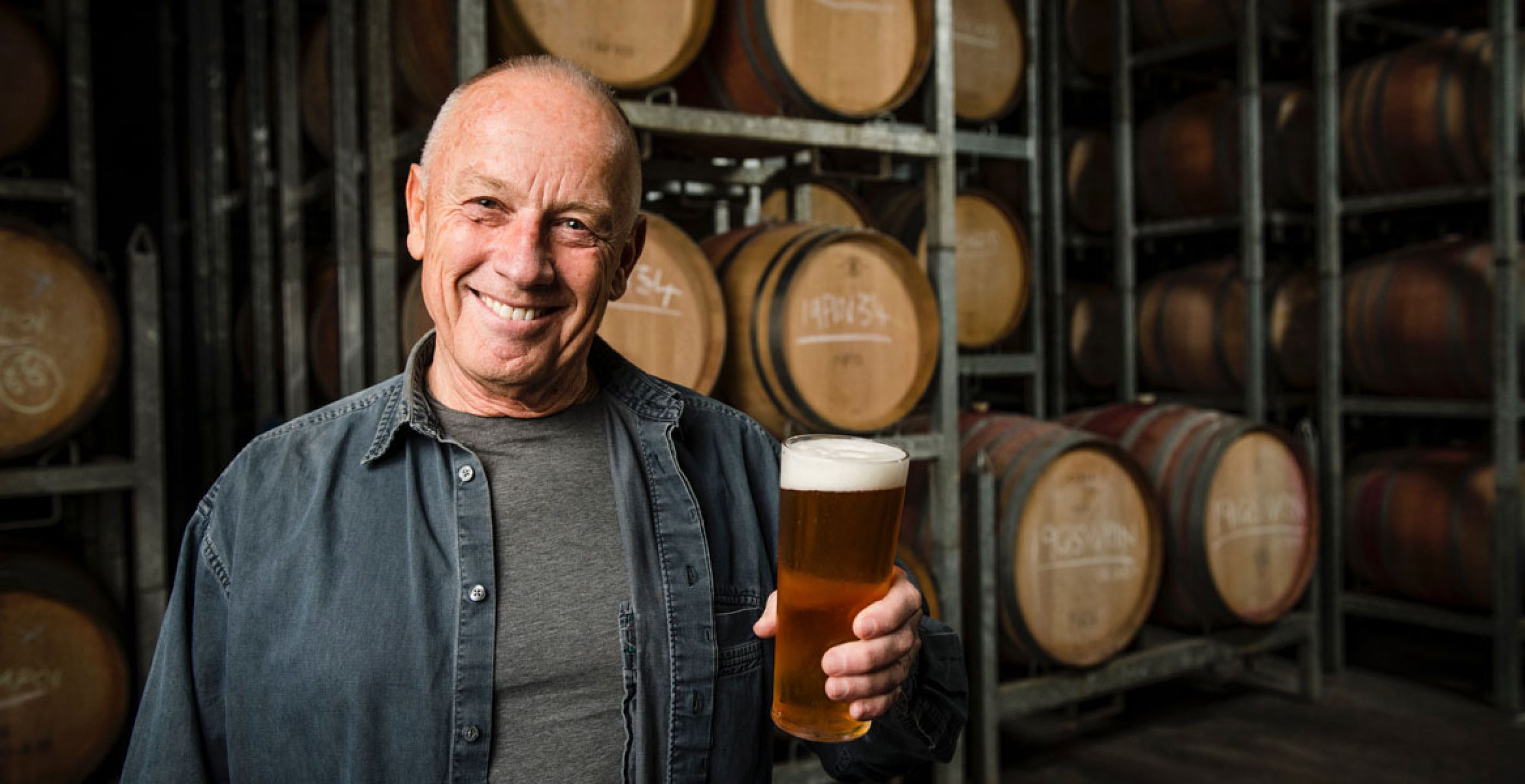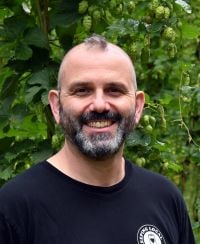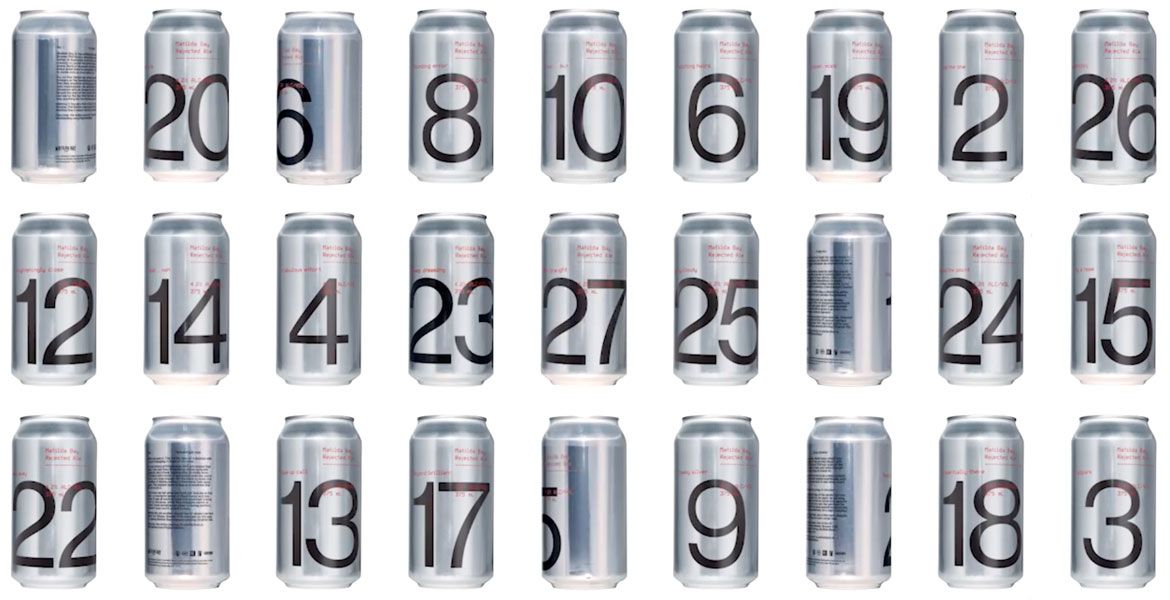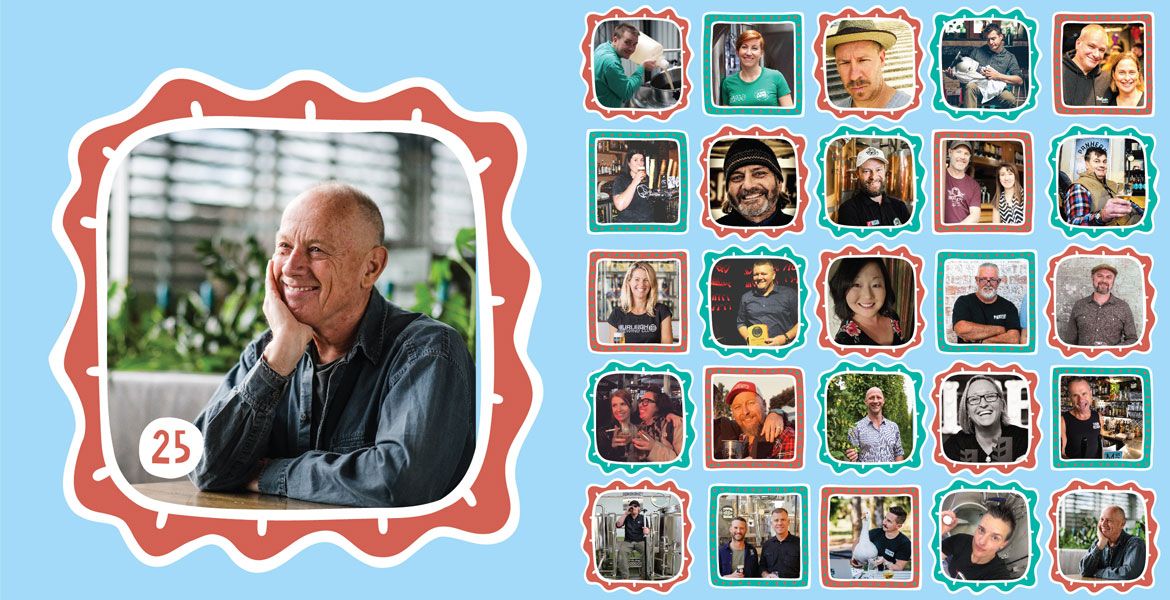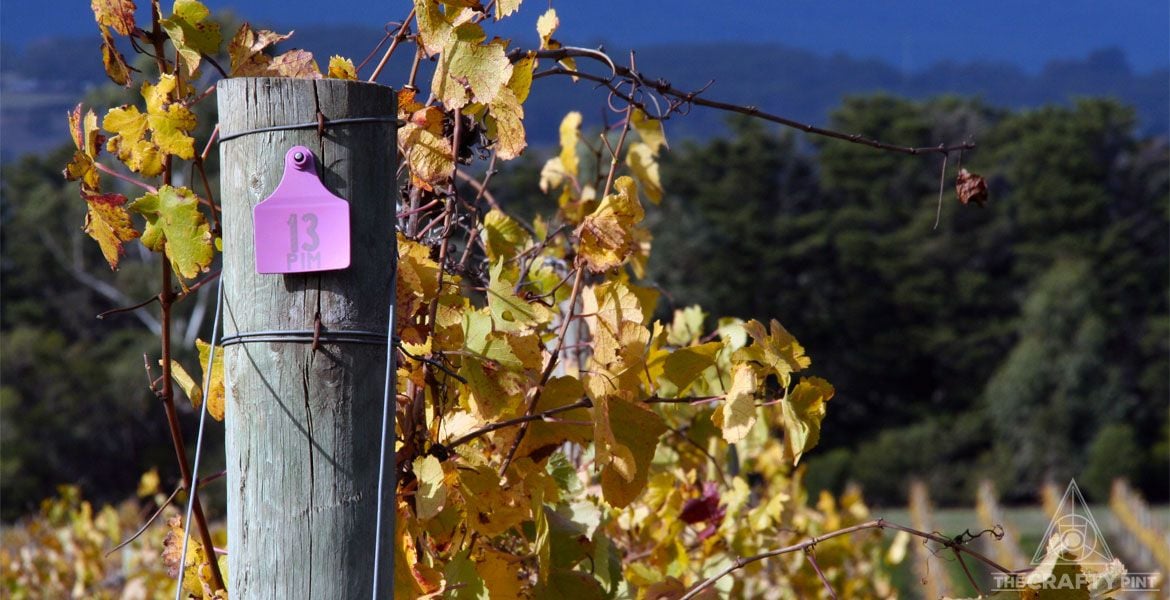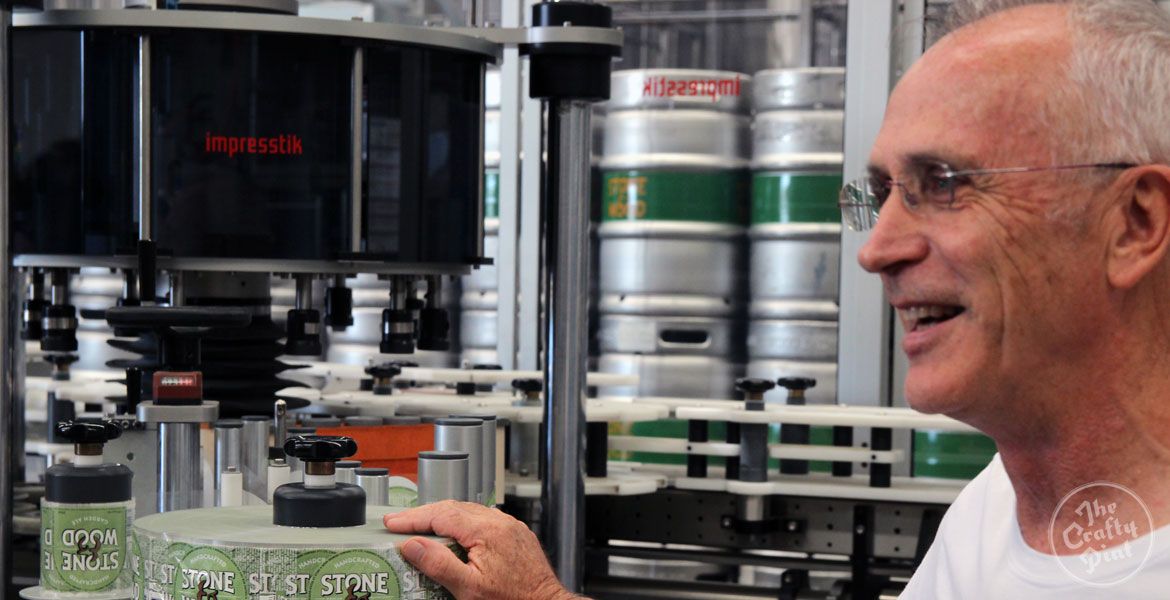NB: The original article we ran before speaking to Phil can be found below.
Rumours that Phil Sexton was somehow involved in a new brewery in the Yarra Valley had been popping up on and off for months. And, given his position within the modern Australian beer world – the Godfather of Australian craft beer is one title we’ve heard bestowed upon him – it was a rumour that generated rather more frisson than most.
Yet the announcement that the man who kick-started the beer revolution here when he commenced brewing at the Sail & Anchor in Fremantle before launching Matilda Bay in 1983 was to return with… a new Matilda Bay brewery in partnership with CUB was still the sort to warrant a second take.
Not only has the Matilda Bay brand become a shadow of its pioneering peak – arguably, a completely different beast altogether – but, from my point of view, there was also Phil’s answer when I’d last chatted to him back in 2015, when he was honoured with a Forefathers beer by Stone & Wood: would he go back to help resurrect the business?
“No. And I’m not sure I’d know what to do.”
Yet, here we are, just weeks away from the opening of a brewery with the Matilda Bay name opening in Healesville, on the site until now occupied by Phil’s Giant Steps winery, with the original founder back at the helm.
Admittedly, it’s set to operate as a standalone entity: the Healesville brewery will create a new beer (of which more later), look to bring back OG classics like Redback and Dogbolter, and experiment with other beers to be served at the brewery venue itself. But other brands associated with Matilda Bay within the wider CUB stable – Yak Ales and Frothy, for example – will be kept separate.
Still, something must have changed over the past few years.
Phil describes an “on again, off again” relationship with CUB dating back to the takeover of Matilda Bay in 1990.
“We were reasonably close at the start and did some fabulous things in the early days in WA,” he says, “but then it drifted back into the field and they turned it over to supplying a voracious market in WA.”
Thus, as the years passed following the takeover, the brewery and associated venues that had done more than any other to shake up the monolithic Aussie beer industry moved further from the founders’ control.
At the same time, Phil moved out and in and out of the beer industry, both here and in the US. While it risks doing his career a disservice, between the start of the 90s and this week’s news, he amassed a CV that includes running wineries in WA and Victoria, helping relaunch BridgePort in the US while creating their trailblazing IPA, returning to Australia to help launch Little Creatures (where he designed the original Little Creatures Pale Ale – then called Live – with fellow winemaker Janice McDonald) as well as sibling brewery White Rabbit when it first opened in Healesville.
In more recent years, as ownership and management changed at CUB, he says there had been conversations about Matilda Bay and what could be done to bring the brand back to prominence.
“I said, ‘Set it free and it will do great,’,” he says.
Then there was a practical element: having taken the decision to move Giant Steps, what was he going to do with the building – impressive and unique in equal measure?
“I built it to be a brewery with a winery in it,” Phil says. “People don’t usually think about wineries like a brewer does, but I did.
“I joked with people that if the winery went broke or I got sick of it we could turn it into a brewery. I thought, ‘Maybe I should find someone who’d like to do a brewery in it. That sounds like me!’
“It’s a weird logic, but it came out like that.”
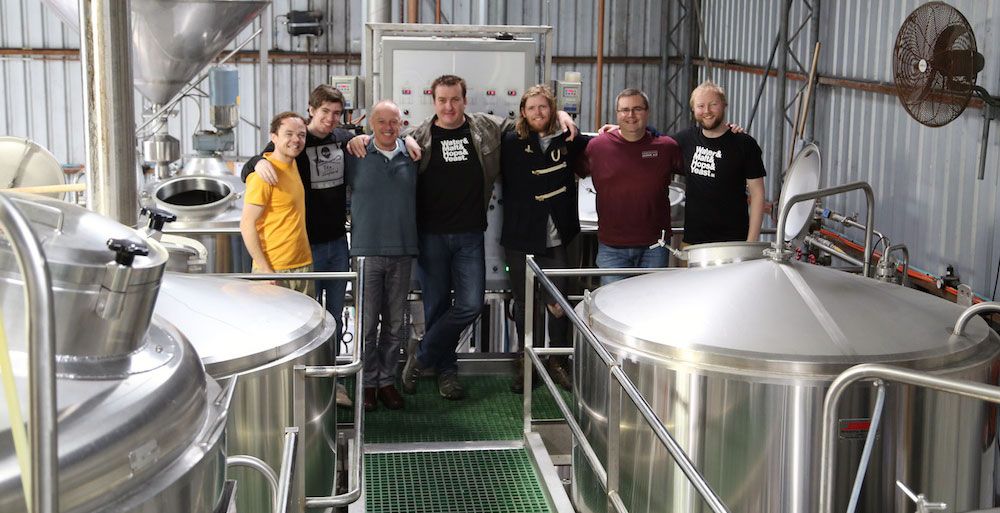
There was also his desire to get out of hospitality, at least the highly involved form that they’d created at Giant Steps, and back to focusing on wine at a new, simpler cellar door amid his vineyards and a creating a more pub-based form of hospo at the brewery.
“There’s a massive difference between a pub selling a lot of beer and a winery trying to sell fine dining to people who expect it,” he says, talking about the changes Giant Steps has been through over the past thirteen years and how “it’s pretty much done my head in!”
Perhaps the biggest driver of all was the connection to the brand he’d helped create.
“There’s so much unfinished business with what we started there. What if we had kept going with it?” he says.
When he initially mentioned his brewery idea to the team at CUB, they were quickly enthused and, over the course of a year and a half, the concept developed until the last of the statutory requirements were in place and they could go public.
As he reenters the Australian beer world once more – although he says he’s always been “bouncing around” it – it’s a very different place to the one he shook up in the early 80s or helped introduce to American style pale ales at the turn of the Millennium.
“The craft beer industry is in an interesting place,” he says in one of the understatements of the year.
So, what does he hope his new Matilda Bay operation can bring to a world in which there’s 600-plus brewing companies and a kaleidoscopic array of beer styles on offer rather than less than ten breweries all making pretty much the same beer?
For one, he hopes to help what he calls the second wave of local craft breweries – the one that started with the likes of Mountain Goat, Holgate, Little Creatures and Nail – avoid what he’s seen happen in the US, where BridgePort has been one of the major victims as the industry has expanded at an unprecedented rate.
“BridgePort closed from nearly one million cases [output per annum],” Phil says. “You go, ‘How the hell has that happened?’. You look closely at the US and a lot [of breweries] are under pressure. Why? They are well into the end of the second wave and I keep reading about breweries being acquired [in Australia] – what’s going to happen here?”
He believes one way to find out is to return to the brewery that started it all – Matilda Bay – and seeing where it can be taken.
“Is it going to be massive? I don’t think so. But is it going to be sustainable and interesting and create a few different ways of doing things? I hope so.”
He’s also driven by a desire to retrain some of the beer world’s focus on centuries-old brewing traditions.
“One of the things I reckon we need to do is to think about the beer and what actually makes craft,” he says. “I just go back to the Reinheitsgebot and the way beer has been for 2,000 years.”
Looking at the more extreme beers capturing much of the attention in today’s beer scene, he asks: “Are they there for show? To get attention? Or to provide something that people love to drink?” and posits as a warning the example of the rise of fruit beers in the States in the past, the subsequent race by brewers to make them more extreme, and his decision not to go down that path at BridgePort, one he says “was absolutely the correct call.”
“I’d like to spend a bit of time and effort on educating people about beer and what we can do with malted cereal grains, water, hops and yeast; let’s talk about balance and finesse, beers that can line up against commercial beers – they’re different but not just because they’re extreme.”
If you’ve read much about Phil or spent time in his company, you’ll be aware of the impact CAMRA (the Campaign for Real Ale) had upon him, after he became heavily involved while a young trainee brewer in the English Midlands. Their influence on the UK beer scene has been on the wane in recent years, but their raison d’etre – one that saw them help real ale not just survive but start to thrive again from the late 70s onwards – has stuck with him. And he came to realise if he cared about beer’s traditions, like Camra, then he needed to get involved.
“There’s no point in my yelling from the outside,” is how he puts it.
As such, when the new brewery starts up later in the year, he’ll be fully involved.
“I wouldn’t let brewers do much without me being there!”
And central to the business, one that will encourage drinkers to come and drink at source with limited kegs servicing the surrounding area and even less beer likely to be packaged, will be a new beer.
“I want to get one beer out that can be successful and that we can really get focus on,” he says. “A beer I want to do and that I’m comfortable with.”
What that looks and tastes like is yet to be revealed, but it will be joined on tap in Healesville by new versions of the original Dogbolter and Redback plus “three or four very specialised craft beers that, if you’re lucky, you might see a few thousand cases”.
What you’ll definitely see is a man who’s done more to shape the Australian beer world over the past four decades than any other back where it started.
“I’ve got five to ten years to deal with some unfinished business,” he says.
Original news story
The man credited with kick-starting a revolution in Australian beer when he brewed the first batch of Anchor Bitter at Fremantle's Sail & Anchor in the early 80s is returning to brewing. What's more, Phil Sexton is returning to the brewing company he founded: Matilda Bay.
The pioneer, who has also enjoyed success in the United States brewing world and launched a number of wineries, is building a Matilda Bay brewery in Healesville on the site of Giant Steps in partnership with CUB. The new venture is set to open by the end of 2019, nearly three decades after the brand was initially acquired by Foster's.
In a statement announcing a move that has already led to much excited chatter in the online beer world, Phil said: "Restoring Matilda Bay to its rightful place as Australia’s leading craft beer is unfinished business for me. I want to grow craft beer by showing people how special good small batch beer can be.
“I founded Matilda Bay in 1983 to give drinkers beautiful craft beer. And as the original craft brewery, it still has a special spot in the consciousness of Aussie beer lovers. It’s the right label to finish what I started and re-affirm what artisanal brewing should stand for: sessionable, flavourful beers that stand the test of time.”
The plan is to reinvigorate a brand that has become lost within the CUB portfolio over the years, spawning the Yak Ales range and, more recently, Frothy. Not only does Matilda Bay hold a unique position in Australian beer history but, under Phil and subsequent brewing teams led by Brad Rogers – later a founder of Stone & Wood – the operation was responsible for many iconic beers, from the Redback wheat beer to the Dogbolter strong ale, Alpha Queen APA and many more.
After leaving Matilda Bay first time around, Phil was enticed back from the US to help launch Little Creatures, designing Little Creatures Pale Ale (then called Live) with fellow winemaker Janice McDonald.
While he had been away from beer for years, when I interviewed him at Giant Steps for 150 Great Australian Beers in the summer of 2013/14, he said he'd consider returning to brewing were he ten years younger – and that he'd consider doing it in Healesville. And now he is, albeit in a manner few would have predicted.
Media release announcing the launch of Matilda Bay in Healesville
Australia’s original craft brewer Phil Sexton is returning to the label he founded more than 35 years ago to reinvigorate the country’s original craft beer.
This will see Phil partner with Carlton & United Breweries, which fully acquired Matilda Bay in 1990, to build a new small-batch brewery in country Victoria that Phil and his team will run.
The brewery will be in Healesville in the Yarra Valley, an hour east of Melbourne, and will have a pub attached. It will exclusively develop and brew a new Matilda Bay range and some Matilda Bay classics such as Redback and Dogbolter.
Phil said the timing was perfect to re-launch Matilda Bay and help craft beer reach its potential in Australia.
“Restoring Matilda Bay to its rightful place as Australia’s leading craft beer is unfinished business for me,” he said. “I want to grow craft beer by showing people how special good small batch beer can be.
“I founded Matilda Bay in 1983 to give drinkers beautiful craft beer. And as the original craft brewery, it still has a special spot in the consciousness of Aussie beer lovers. It’s the right label to finish what I started and re-affirm what artisanal brewing should stand for: sessionable, flavourful beers that stand the test of time.”
Phil is one of Australia’s leading brewers and winemakers. In addition to Matilda Bay, he founded Little Creatures and launched Giant Steps and Innocent Bystander wineries. He said sustainability is a critical part of the new project, with solar panels supplying power and all waste to be recycled. The brewery will use pristine Healesville water.
“This is also about creating a beautiful new attraction in the town I love and live in,” he said. “There is something special about drinking great small-batch beer where it’s brewed.”
CUB CEO Peter Filipovic said: “Phil will oversee everything from brewery construction to brewing and marketing. He is a craft beer visionary who revolutionised Australia’s beer landscape. There is no one in the world more suited to delivering this venture than him.
“We’re meeting the changing needs of consumers by creating beautiful new beers in pristine surroundings that live up to Matilda Bay and Phil’s original vision. We couldn’t be more excited about this opportunity and we know beer drinkers will love it.”
The Matilda Bay brewery and pub will be built on the site currently occupied by Giant Steps winery and restaurant, which is owned by Phil. Construction is expected to start in coming weeks and the brewery is expected to be operational by the end of the year. More than 20 new jobs will be created.
The current Giant Steps site will close Sunday. Tasting will re-open immediately at a new site in Healesville and the winery will re-open soon, with more details to be announced in coming months.



